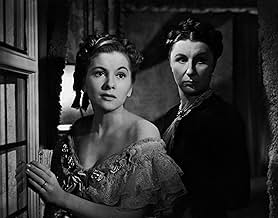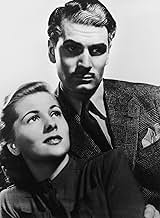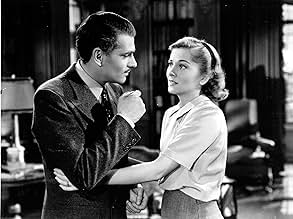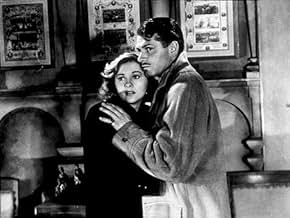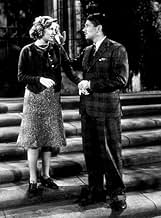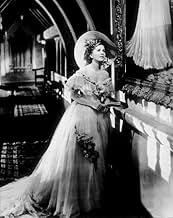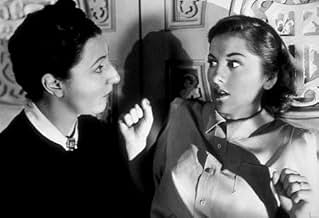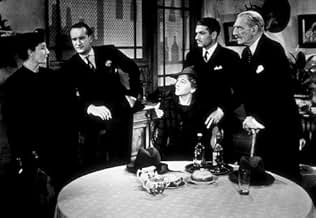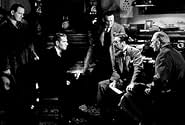एक आत्म-जागरूक महिला एक अभिजात की पत्नी के रूप में अपनी नई पहचान और उसके पति की पहली पत्नी की वर्णक्रमीय उपस्थिति के बीच संघर्ष करती है.एक आत्म-जागरूक महिला एक अभिजात की पत्नी के रूप में अपनी नई पहचान और उसके पति की पहली पत्नी की वर्णक्रमीय उपस्थिति के बीच संघर्ष करती है.एक आत्म-जागरूक महिला एक अभिजात की पत्नी के रूप में अपनी नई पहचान और उसके पति की पहली पत्नी की वर्णक्रमीय उपस्थिति के बीच संघर्ष करती है.
- 2 ऑस्कर जीते
- 10 जीत और कुल 10 नामांकन
Bunny Beatty
- Maid
- (बिना क्रेडिट के)
Billy Bevan
- Policeman
- (बिना क्रेडिट के)
सारांश
Reviewers say 'Rebecca' is acclaimed for its atmospheric storytelling and psychological tension, showcasing Alfred Hitchcock's masterful direction. The film's haunting ambiance, complex characters, and enigmatic Rebecca are highlighted. Key themes include identity, memory, and the struggle of the second Mrs. de Winter. Performances by Joan Fontaine, Laurence Olivier, and Judith Anderson are praised. Cinematography and set design enhance the gothic suspense. Some find the plot uneven and the ending less satisfying, but it remains a significant work in Hitchcock's career.
फ़ीचर्ड समीक्षाएं
Hitchcock felt 'Rebecca', his first Hollywood film, was a compromise, but as a viewer I just can't fault it. It's a masterpiece in my opinion, full of suspense, mystery and brooding atmosphere. It's also one of the most romantic movies I've ever seen. I've watched it several times over the years, and even now that I know all the plot twists and turns (quite shocking on your first viewing), it never fails to hook me in. One of the reasons it really works is the flawless casting. I'm not much of an Olivier fan but he's superb as de Winter, with just the right mixture of charm and coldness. And Joan Fontaine is just perfect as de Winter's new bride. I can't spot an unconvincing moment in her performance and can't imagine any other actress in the role. Hitchcock subsequently used her in 'Suspicion' with Cary Grant. She was also excellent in that but 'Rebecca' is a much stronger movie. The supporting cast also includes some brilliant performances, especially Judith Anderson ('Laura') as the extremely creepy Mrs. Danvers, George Sanders who plays Rebecca's slimy cousin, and Nigel Bruce in a typical role as de Winter's bumbling brother-in-law Major Lacy. Sanders subsequently worked again with Hitchcock in 'Foreign Correspondent', and Bruce played Cary Grant's lovable pal "Beaky" in 'Suspicion'. I sometimes think that Hitchcock's 1940s movies are overlooked by many because they are regarded as being too "old fashioned", but for me movies like 'Suspicion', 'Saboteur', 'Lifeboat' and 'Spellbound' are some of the most entertaining movies Hitchcock ever made, and 'Rebecca' is the best of the lot. If you want to be totally enthralled for two hours just watch 'Rebecca'!
This fine classic combines a great director, a great story, and a great cast. Any one of those would have made for a good movie, but all three make it an excellent one. Hitchcock's style and eye for detail combine very well with a story (from a novel that is extremely good in its own right) filled with psychological fear and settings that are interesting and suggestive.
Most of the time the story itself moves fairly slowly, allowing the focus to be on the characters, but there are also a couple of very good plot twists, which can be very surprising if you've not seen the movie or read the novel. So if you happen not to know the story, it's a good idea to see the film before reading a lot of comments about it. Laurence Olivier, Joan Fontaine, Judith Anderson, and George Sanders are all perfectly cast and do a wonderful job bringing their characters to life, and making you feel a part of the story.
"Rebecca" should be satisfying not only to any Hitchcock fan, but to anyone who likes classic movies. Whether you like romance, suspense, or drama, they're all here, and put together by a director and cast that are masters of their art.
Most of the time the story itself moves fairly slowly, allowing the focus to be on the characters, but there are also a couple of very good plot twists, which can be very surprising if you've not seen the movie or read the novel. So if you happen not to know the story, it's a good idea to see the film before reading a lot of comments about it. Laurence Olivier, Joan Fontaine, Judith Anderson, and George Sanders are all perfectly cast and do a wonderful job bringing their characters to life, and making you feel a part of the story.
"Rebecca" should be satisfying not only to any Hitchcock fan, but to anyone who likes classic movies. Whether you like romance, suspense, or drama, they're all here, and put together by a director and cast that are masters of their art.
Hitchcock's first American movie, a word, American that is, that should be put in quotes because as Hitchcock pointed out, all of the cast and almost all of the crew were British. The film has already garnered so many comments that I'll avoid repeating most of them. The plot I'm sure has been thoroughly outlined and professionally analyzed but a few points are worth emphasis.
The plot of very precisely structured. It consists basically of a man who is the dream of many women in the 1940s audience: ruggedly handsome, intelligent, keen witted, a bit commanding but not too much, fabulously wealthy, a touch roguish, and mysterious. It's the mystery that provides the plot engine. Every incident of his past emotional life needs to be pried out of Maxim deWinter (what a name, suggesting frigidity and distance) as if it were an abcessed tooth. Each secret, as he reveals it, is a surprise to his wife. Except for the final secret uncovered in the plot, which surprises everybody. Maxim could clear the whole mystery up with an hour's worth of private conversation with his wife. But of course he doesn't, or else there would be no story. That's why Hamlet takes so long to slaughter Claudius. And why the Indians don't shoot the horses as they're chasing the stagecoach.
The acting. Olivier is extremely good at impersonating deWinter with all his charm and challenge. George Sanders is the best cad that the movies ever produced, and he proves it again here. Mrs. Danvers has a face and an expression that looks like an ice sculpture. The implicit lesbianism in her character of course had to remain implicit, but it is still rather a shock when she tenderly unfolds Mrs. DeWinter's nightie and says smoothly, "Look, you can see my hand through it." As for Joan Fontaine, a friend in Ireland said of her performance, "She does the shivering wife very well." Precisely put. With her delicate bone structure, fragile looking limbs, and her overall ikabani flower arrangement appearance, her wide asymmetrical eyes, with one brow arching up over her pale forehead, she looks about to faint with fright through half the movie. The only thing coarse about her is her wardrobe: bulky knit sweaters over her girlish bosom, long flapping drab skirts over her small but saucy rump, and those clodhoppers she wears while clunking about the house. She does the shivering naif in at least two other films of the period -- Hitchcock's "Suspicion" and "Jane Eyre." In fact, rummaging through the disarranged attic that is my long-term memory, I can't really remember her "doing" any other role.
It's the closest Hitchcock ever came to making what was then called "a woman's picture." It received a "best picture" Oscar, which went to Selznick. Something Hitchcock seemed to resent for the remainder of his life. It was a commercial and critical success and it deserved to be.
The plot of very precisely structured. It consists basically of a man who is the dream of many women in the 1940s audience: ruggedly handsome, intelligent, keen witted, a bit commanding but not too much, fabulously wealthy, a touch roguish, and mysterious. It's the mystery that provides the plot engine. Every incident of his past emotional life needs to be pried out of Maxim deWinter (what a name, suggesting frigidity and distance) as if it were an abcessed tooth. Each secret, as he reveals it, is a surprise to his wife. Except for the final secret uncovered in the plot, which surprises everybody. Maxim could clear the whole mystery up with an hour's worth of private conversation with his wife. But of course he doesn't, or else there would be no story. That's why Hamlet takes so long to slaughter Claudius. And why the Indians don't shoot the horses as they're chasing the stagecoach.
The acting. Olivier is extremely good at impersonating deWinter with all his charm and challenge. George Sanders is the best cad that the movies ever produced, and he proves it again here. Mrs. Danvers has a face and an expression that looks like an ice sculpture. The implicit lesbianism in her character of course had to remain implicit, but it is still rather a shock when she tenderly unfolds Mrs. DeWinter's nightie and says smoothly, "Look, you can see my hand through it." As for Joan Fontaine, a friend in Ireland said of her performance, "She does the shivering wife very well." Precisely put. With her delicate bone structure, fragile looking limbs, and her overall ikabani flower arrangement appearance, her wide asymmetrical eyes, with one brow arching up over her pale forehead, she looks about to faint with fright through half the movie. The only thing coarse about her is her wardrobe: bulky knit sweaters over her girlish bosom, long flapping drab skirts over her small but saucy rump, and those clodhoppers she wears while clunking about the house. She does the shivering naif in at least two other films of the period -- Hitchcock's "Suspicion" and "Jane Eyre." In fact, rummaging through the disarranged attic that is my long-term memory, I can't really remember her "doing" any other role.
It's the closest Hitchcock ever came to making what was then called "a woman's picture." It received a "best picture" Oscar, which went to Selznick. Something Hitchcock seemed to resent for the remainder of his life. It was a commercial and critical success and it deserved to be.
This was Alfred Hitchcock's first American-made film. Quite frankly, I'm amazed at how well Hitchcock "got" what American audiences wanted in their suspense films, hitting them out of the park from the moment he began working in the US.
Apart from being a tad bit long, this is a well made film. I love the inside of Mandalay and Sir Laurence Olivier played a wonderful mysterious and sullen Maximillian De Winter opposite his new wife, a beautiful and naive young Joan Fontaine who is never even given a name here, probably deliberately and in keeping with how mousy and "second hand" she feels about herself in relation to the first and late Mrs. De Winter, who is actually Rebecca from the title.
Of course there is also George Sanders, playing the type of character he is best known for--sarcastic, snobby, self-assured, pompous, witty and verbose. He hits the nail on the head as Rebecca's "cousin" - so he calls himself. Of course the most eerie and unsettling character was Mrs. Danvers, Rebecca's housekeeper or "maid in waiting." Danvers takes great pains in sabotaging the second Mrs. De Winter's marital relationship with Max de Winter,--even going as far as calmly urging her to to plunge to her death into the water from Rebecca's bedroom window at Mandalay. There are a couple of twists in this movie, but I won't give them away. It's best if you watch them unfold yourself in true Hitchcockian style.
I will say that Rebecca, the first wife of Max de Winter, is NEVER seen, but we learn about her by what is said about her by the various characters, even going as far as seeing the untouched shrine of a bedroom maintained by Mrs. Danvers. But soon you learn that Rebecca was never the perfect wife Danvers and others make her out to be. The ending is a surprise in more way than one, and yet Mrs. Danvers gets the last word in her own way. A great movie by Alfred Hitchcock and David O. Selznick.
Apart from being a tad bit long, this is a well made film. I love the inside of Mandalay and Sir Laurence Olivier played a wonderful mysterious and sullen Maximillian De Winter opposite his new wife, a beautiful and naive young Joan Fontaine who is never even given a name here, probably deliberately and in keeping with how mousy and "second hand" she feels about herself in relation to the first and late Mrs. De Winter, who is actually Rebecca from the title.
Of course there is also George Sanders, playing the type of character he is best known for--sarcastic, snobby, self-assured, pompous, witty and verbose. He hits the nail on the head as Rebecca's "cousin" - so he calls himself. Of course the most eerie and unsettling character was Mrs. Danvers, Rebecca's housekeeper or "maid in waiting." Danvers takes great pains in sabotaging the second Mrs. De Winter's marital relationship with Max de Winter,--even going as far as calmly urging her to to plunge to her death into the water from Rebecca's bedroom window at Mandalay. There are a couple of twists in this movie, but I won't give them away. It's best if you watch them unfold yourself in true Hitchcockian style.
I will say that Rebecca, the first wife of Max de Winter, is NEVER seen, but we learn about her by what is said about her by the various characters, even going as far as seeing the untouched shrine of a bedroom maintained by Mrs. Danvers. But soon you learn that Rebecca was never the perfect wife Danvers and others make her out to be. The ending is a surprise in more way than one, and yet Mrs. Danvers gets the last word in her own way. A great movie by Alfred Hitchcock and David O. Selznick.
This is a Daphne Du Maurier's story (from a best-seller novel) concerning a prominent widower (Laurence Olivier) called Maxim De Winter who finds a gorgeous and timid young girl (Joan Fontaine) who is serving to an old Mistress (Florence Bates) . They are married and head to Manderley , the familiar mansion (in the exterior actually is a scale model). But Maxim is haunted by the ghost first wife , an enigmatic Rebecca , who died in mysterious circumstances . There works as a servant the creepy and obsessive housekeeper , Mrs Danvers (Judith Anderson,a famous stage actress in her most important role) and sh meets a cynic gentleman (George Sanders).
This film has suspense , romance , unlimited tension , full of lingering images and with the typical touches Hitchcock . Besides , a literately and thoughtful dialog signed by Joan Harrison (Hitchcock's usual screenwriter) though lacking humor . After ¨39 steps¨and ¨Jamaica Inn¨ , Hitch was encouraged to go to America and promptly shot his first work in Hollywood hired by the great producer David O'Selznick . Fine performance by Laurence Olivier , he married Vivien Leigh and he wished to her as protagonist but Hitch hired Joan Fontaine who took seven rehearsal sessions until the engaging . Joan Fontaine as a shy bride young is superb and enjoyable . Judith Anderson as a spooky and cold house keeper is top-notch, her role as obsessed person by the glamorous Rebecca is unforgotten and immortal . Atmospheric and perceptible music by Franz Waxman and sensational visual style by the cameraman George Barnes . The picture won Academy Awards for Best film and cinematography . The movie was brilliantly directed by the Master of Suspense . It's remade in inferior versions for Television, the 1980 adaptation with Jeremy Brett as Maxim and 1996 rendition with Charles Dance and Emilie Fox . The motion picture is indispensable watching for Hithcock lovers achieving the maximum impact on his audience.
This film has suspense , romance , unlimited tension , full of lingering images and with the typical touches Hitchcock . Besides , a literately and thoughtful dialog signed by Joan Harrison (Hitchcock's usual screenwriter) though lacking humor . After ¨39 steps¨and ¨Jamaica Inn¨ , Hitch was encouraged to go to America and promptly shot his first work in Hollywood hired by the great producer David O'Selznick . Fine performance by Laurence Olivier , he married Vivien Leigh and he wished to her as protagonist but Hitch hired Joan Fontaine who took seven rehearsal sessions until the engaging . Joan Fontaine as a shy bride young is superb and enjoyable . Judith Anderson as a spooky and cold house keeper is top-notch, her role as obsessed person by the glamorous Rebecca is unforgotten and immortal . Atmospheric and perceptible music by Franz Waxman and sensational visual style by the cameraman George Barnes . The picture won Academy Awards for Best film and cinematography . The movie was brilliantly directed by the Master of Suspense . It's remade in inferior versions for Television, the 1980 adaptation with Jeremy Brett as Maxim and 1996 rendition with Charles Dance and Emilie Fox . The motion picture is indispensable watching for Hithcock lovers achieving the maximum impact on his audience.
Oscars Best Picture Winners, Ranked
Oscars Best Picture Winners, Ranked
See the complete list of Oscars Best Picture winners, ranked by IMDb ratings.
क्या आपको पता है
- ट्रिवियाOver 20 actresses were screen-tested for the role of Mrs. de Winter, which eventually went to newcomer Joan Fontaine. One of them was Vivien Leigh, for whom Sir Laurence Olivier was pressing, as they were a couple at the time.
- गूफ़In the outside take of Manderley seen in the scene where the Narrator stares at one window being closed, it's a miniature, as is the 'Mrs Danvers' dummy dressed in black. You can realize this by the motion of the window as it's being closed, not in a continuous way, but by little fast jumps, which look too unreal.
- भाव
[the new Mrs. de Winter wants to dispose of Rebecca's letters]
The Second Mrs. de Winter: I want you to get rid of all these things.
Mrs. Danvers: But these are Mrs. de Winter's things.
The Second Mrs. de Winter: *I* am Mrs. de Winter now!
- क्रेज़ी क्रेडिटThe original 1940 credits read "Selznick International presents its picturization of Daphne Du Maurier's 'Rebecca'". The credits on the re-issue version read "The Selznick Studio presents its production of Daphne Du Maurier's 'Rebecca'".
- इसके अलावा अन्य वर्जनThe opening credits were re-done (with different font) for the 1950's re-release of the movie. It is these credits that have turned up on all telecasts of the film (even as recently as 2013) and all previous video releases. The Criterion release (which is now only available through outlet stores) restores all of the credits to their original form.
- कनेक्शनEdited into The Last Tycoon: Pilot (2016)
- साउंडट्रैकLove's Old Sweet Song (Just a Song at Twilight)
(1884) (uncredited)
Music by J.L. Molloy
Hummed by Joan Fontaine
टॉप पसंद
रेटिंग देने के लिए साइन-इन करें और वैयक्तिकृत सुझावों के लिए वॉचलिस्ट करें
विवरण
बॉक्स ऑफ़िस
- बजट
- $12,88,000(अनुमानित)
- दुनिया भर में सकल
- $1,13,328
- चलने की अवधि2 घंटे 10 मिनट
- रंग
- पक्ष अनुपात
- 1.37 : 1
इस पेज में योगदान दें
किसी बदलाव का सुझाव दें या अनुपलब्ध कॉन्टेंट जोड़ें




